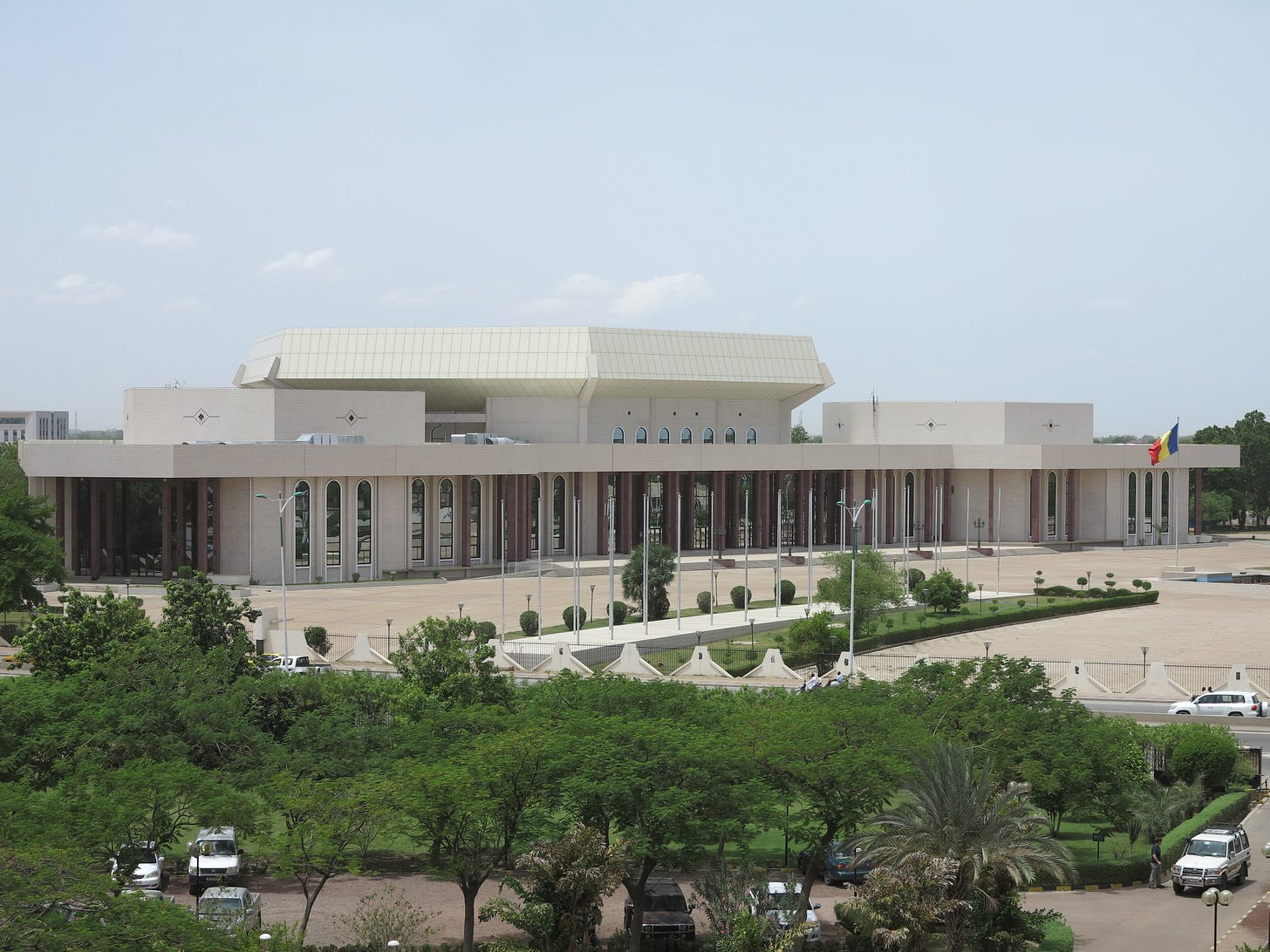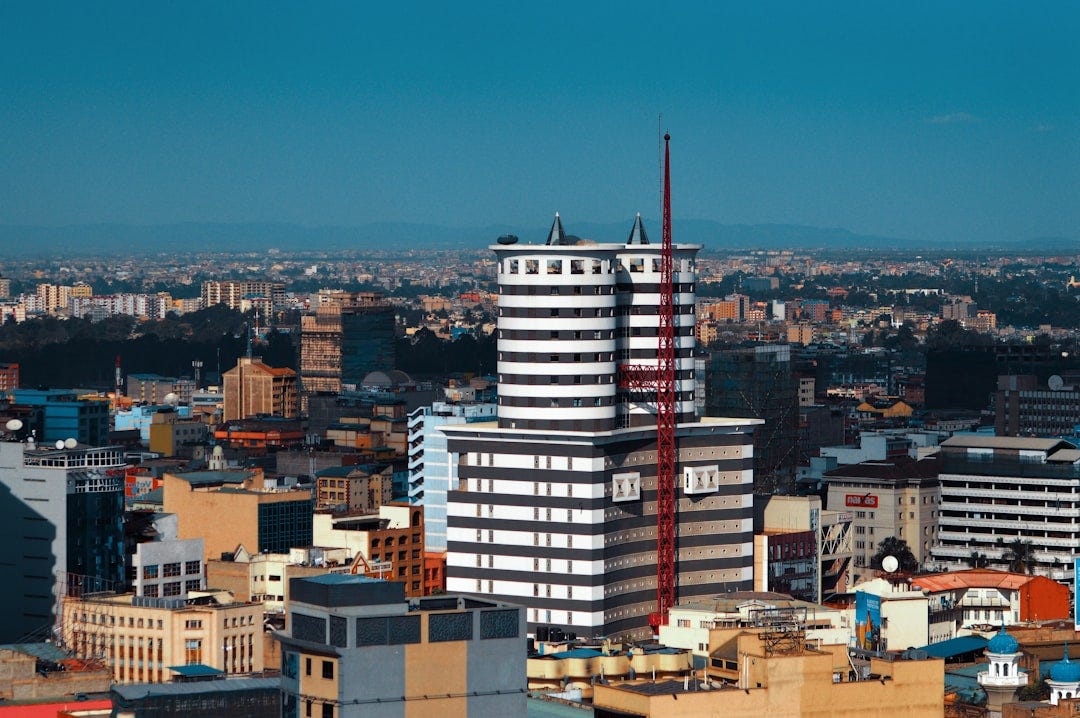🔅 We Feature Chimamanda Ngozi Adichie, Again
The Man Born Enslaved in the US who Aspired to Be Emperor of Ethiopia
Good Morning from D’Jamena, Chad!
Chimamanda Ngozi Adichie: New Babies, a New Novel, and a Lot to Say About Cancel Culture
You’d think Chimamanda Ngozi Adichie wouldn’t have many surprises left. Yet, here she is in 2025, quietly revealing that she’s had 10-month-old twins, all while putting the finishing touches on her first novel in over a decade, Dream Count.
We shared an excerpt from her new book last week, but in this new profile by The Guardian, Adichie discusses the challenges that nearly derailed her writing: losing both parents in quick succession, the pandemic’s creative drain, the bruising fallout over her comments on gender identity, and—yes—juggling motherhood with literary stardom.
Now, at 47, she’s found her groove again. She explains why Dream Count explores the gritty realities of womanhood—fibroids, fertility struggles, and transatlantic clashes of culture—while still capturing her trademark wit. She also opens up about her view on cancel culture (“Bad. We should stop it. End of story.”).
Dream Count marks a welcome return to the realm of fiction for one of the most influential voices in contemporary literature—a voice that still has plenty to say.
Born Enslaved in the US, Aspired to Be Emperor of Ethiopia: The Audacity of William Henry Ellis
This isn’t your classic rags-to-riches tale – it is the story of William Henry Ellis, who took ambition to a whole new level. Born into slavery in Texas in 1864, this self-made entrepreneur eventually dreamed of staking a claim on nothing less than the throne of Ethiopia. Yes, the throne.
Ellis first made a name for himself by crossing borders—literally and figuratively. Passing as a Mexican, he built a thriving business in San Antonio and played a behind-the-scenes role in Black Republican politics. When U.S. racial dynamics proved too rigid, he looked elsewhere. His big idea? Convincing Black Southerners that their future lay not in America or even Africa, but in Mexico.
And so, in the 1890s, Ellis tried to relocate Black Southerners to farmland in nearby Mexico—twice. Both times, chaos ensued, and his cover story (that he was definitely not a Black Texan) started fraying. But rather than go quietly into some corner, Ellis found a new horizon: Ethiopia.
At the time, Ethiopia—commonly known then as Abyssinia—was Africa’s shining example of resistance to colonial rule. Under Emperor Menelik II, the nation defeated an attempted Italian invasion at the famous Battle of Adwa. When Ellis ran into an Ethiopian general in London during King Edward VII’s coronation, he saw his opportunity. Why just set up farmland for African Americans in Mexico when you can aim to unite Black diaspora with Africa’s proud, sovereign empire?
The Man Who Would Be King (of Ethiopia?)
Ellis managed to hitch a ride with an American diplomat, Kent J. Loomis, who was set to deliver a friendship treaty from President Teddy Roosevelt to Menelik’s court. Loomis vanished mid-voyage—never found—and rumors swirled (some pointed fingers at Ellis, though official conclusions cleared him). Undeterred, Ellis waltzed into Ethiopia with the treaty in hand, forging ties with the emperor. He’d brag that Menelik named him “Duke of Harrar,” and rumor had it Ellis fully intended to succeed Menelik. Because hey, if you’re going to rebrand yourself, why not aim for an imperial crown?
While he didn’t exactly become the next occupant of Ethiopia’s storied throne, Ellis remained enchanted with the idea of settling African Americans in Menelik’s domain. Ethiopia was an autonomous African power—ripe, he felt, for forging alliances with the Black diaspora. And for a man who’d repeatedly tried large-scale colonization plans, relocating thousands of folks to the Horn of Africa probably seemed as feasible as anything else on his big to-do list.
Always the Hustler
Despite failing to dethrone Menelik, Ellis provided a flamboyant footnote to history with his was part Liberian-style colonization scheme, part high-society brokerage, and part half-serious (or maybe very serious) aspiration to become an African monarch.
Whether you see him as a visionary or a reckless dreamer, there’s no denying Ellis’s saga is a testament to how far sheer nerve and unbridled imagination can take you—even if it stops just short of a coronation in Addis Ababa.
He lived a fascinating life, and you can read about it here.
1 Million Jobs? Kenya is Sending its Workers Abroad
Nairobi, Kenya — Photo by Joecalih
Kenya’s got a new solution for its unemployment problem and it involves sending folks somewhere else. Think of it like a massive foreign exchange program, except instead of college kids spending a semester abroad, we’re talking about one million Kenyans heading off to jobs in richer countries.
Why So Many Kenyans, and Why Now?
Every year, about a million fresh-faced Kenyan jobseekers enter the workforce. Only 20% land formal employment at home. And the Kenyan government’s ensuing idea is to ship out all that young, skilled (or even semi-skilled) labor to Germany, Denmark, the Middle East—wherever they need a helping hand in everything from farm work to nursing to sheep-shearing.
In fairness, however, it’s not just Kenya getting creative with labor exports:
Ethiopia wants to send 700,000 people abroad by next July, up from 100,000.
Tanzania is also looking to strike deals with countries like the UAE.
Why Are Wealthy Nations So Thirsty for Workers?
Ever seen those restaurants in Germany that are closed Mondays, Tuesdays... basically half the week because they can’t find enough staff? Yeah, that’s part of it. Populations are aging in many Western countries—someone’s gotta pay those pensions (and babysit the robots).
Germany, for instance, needs about 400,000 skilled workers a year just to keep the sausage-and-sauerkraut economy chugging along. So if they can bring in eager Kenyans (and others), problem solved, right? Well, not so fast…
The Political Elephant(s) in the Room
Germany’s Election Jitters: Anti-immigrant sentiment has been rising. The far-right AfD party complains the migration policy is too lenient, while the coalition in power complains, “But we need employees to run our businesses.”
Kenyan Criticism: Some folks at home grumble this is basically the government bailing on creating local jobs—and that it might spark a “brain drain,” especially with healthcare workers heading overseas.
The (Potentially) Good and the Bad
Good: Workers earn bigger salaries, send money home, and presumably acquire new skills.
Bad: Some job seekers end up facing steep recruitment fees—thousands of dollars upfront—just to get on the plane. Also, there’s the risk of unscrupulous employers and shady agencies.
Still, Kenya’s minister insists a regulated “official route” to foreign jobs is better than letting people venture abroad through dodgy channels.
As populations balloon across sub-Saharan Africa and shrink in parts of the West, “labor exporting” is morphing into an international handshake deal: Africa gets employment solutions and remittances; Western economies fill critical job gaps.
Will it work? If you can handle really cold winters (looking at you, German weather), brush up on your foreign language skills, and secure that sweet job, it might just be a lifeline—both for you and the Kenyan economy. After all, in a global job market, sometimes the best (and only) way up is … out.
Last Week in Numbers
🇪🇹 A $400 Million Investment: Aliko Dangote’s plan to revive a second production line at Ethiopia’s Mugher cement plant aims to double capacity to 5 million tons. Despite violence that claimed the lives of three staff in 2018, the new expansion is expected to be ready in 30 months.
🇲🇱 48 Deaths: An artisanal gold mine collapse in western Mali killed mostly women searching for scraps in pits left by industrial miners. Authorities in Kayes region are still investigating the tragic accident in a nation where small-scale mining has become more lucrative with rising gold prices.
🇪🇺 A $72 Billion Gap: The European Union, which contributed $100 billion in aid last year, says it cannot fill the void left by the US’s suspended international assistance programs. Washington, the largest single donor, doled out $72 billion in 2023.
🇿🇦 260 Million Customers: Vodacom targets a leap from 210 million to 260 million customers by 2030, propelling core profit growth into double digits, up from 7.8%. Meanwhile, Finance Minister Enoch Godongwana’s hush-hush proposal to lift VAT by 2% blindsided coalition partners, prompting a budget revision. Elsewhere, the government is drafting an early retirement offer for civil servants aged 55–60, waiving penalties and paying out severance for up to two decades of service.
🇳🇬 $79.5 Billion: The amount Nigeria is suing crypto giant Binance, blaming it for currency woes and demanding $2 billion in back taxes. Meanwhile, the Netherlands will return over 100 Benin Bronzes looted by British forces in 1897, bolstering Nigeria’s campaign to reclaim thousands of stolen cultural treasures.
🇨🇩 1 Seized City: Rwanda-backed M23 rebels took control of Bukavu in eastern DRC, now commanding the entire border region along Lake Kivu. The Congolese government accuses Rwanda of orchestrating a prolonged occupation, stoking fears of wider conflict.
🌍 4.1% Growth: The African Development Bank’s latest outlook forecasts a 0.9-point jump from 2024, citing reforms that will ease inflation and improve debt positions. Twelve of the world’s 20 fastest-growing economies are African, with South Sudan surging 34.4%, while Rwanda, Senegal, and Uganda each top 7%. Equatorial Guinea and Sudan remain the continent’s only expected economic shrinkers in 2025.
🇳🇪 5 Years: Niger’s military junta-led commission proposes at least a five-year wait for democracy after booting President Mohamed Bazoum in 2023—exceeding the junta’s earlier three-year transition plan.
Food for Thought
“Life can be understood backwards but we live it forwards.”
— Congo Proverb








Looks good on her. Way to go girl and congratulations!